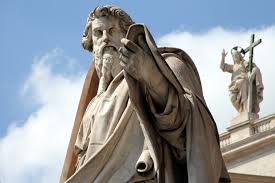
Sanhedrin.
Chap. 9 of Acts goes on to narrate the Conversion of Saul, one of three accounts of this conversion in Acts. As Saul nears Damascus “. . . a light from the sky suddenly flashed around him and he fell to the ground and he heard a voice saying: ‘Saul, Saul why are you persecuting me?’” Modern interpreters of Paul’s Letters as well as the Acts of the Apostles raise the question whether Paul’s experience on the road to Damascus should be labeled a “conversion” or a “call.” In comparison, St. Augustine underwent a real conversion experience but Paul’s experience is quite different.
We have no insight into what actually happened to Paul on the road to Damascus. Luke does not try to analyze Paul’s experience in any of his three different accounts. What we do know is that Paul not only became the Apostle of the Gentiles but it would not be an exaggeration to state that Paul was the greatest Apostle of Christianity. Almost two-thirds of the Acts of the Apostles centers on Paul’s missionary work, his three missionary journeys traveling through the known world and his suffering many hardships. –Fr. Bill
